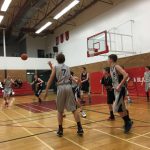ATAMANENKO: Canada-US Security
Over the past few months I have talked to people who have experienced difficulties at the US border. Often this involves having to leave one’s vehicle and being subjected to intense interrogation. What has, in the past, been a routine “friendly” crossing has turned into a “negative” interrogation by abusive American border guards.
There appear to be more barriers to Canadians who travel to the US starting with the new passport requirements. A number of companies have had to abandon just-in-time shipping practises and stockpile their goods. This is because of the uncertainty created about the delays in shipping to the US.
At the same time that cross-border travel is becoming more difficult for Canadians, talks are going on between the US and Canadian governments to create an integrated continental security perimeter. Supposedly, once this happens, we will return to the “happy times” of hassle-free border crossings.
Much like the negotiations going on in regard to the proposed Canada European Free Trade Agreement (CETA), we are not really aware of what is being discussed behind closed doors. Apparently there appears to be a draft agreement and a plan of implementation. All this without any public input or discussion in Parliament.
Both US Secretary of State Hillary Clinton and Homeland Security Secretary Janet Napolitano have both expressed a desire to harden the border between the US and Canada.
Security has intensified and red tape has become more intrusive for people and companies doing business in the US. There are more than 2000 US agents patrolling the Canada-US border, predator drones, Blackhawk helicopters, radiation detectors, radar towers, remote motion sensors, full body scanners and pat-downs. This is a multibillion dollar infrastructure investment aimed at strengthening the border, not introducing a joint security perimeter as the proposed agreement suggests.
It would appear to me that the Americans want us to harmonize visa and asylum rules along with screening and tracking procedures for people coming to North America and also share data on the entry and exit of foreign nationals.
We are also told that airline companies travelling over US airspace will have to submit a list of those on board to the US government even if their plane is not landing in the US. In other words, if we fly to Mexico or Cuba over US airspace, the US government wants to check our names with their no-fly list.
I find it hard to believe even if our two countries were to reach an agreement on security perimeter, that all of a sudden we would return to the “good old times” of two friendly neighbours sharing a common border. The American obsession with terrorism and security has translated into a multibillion dollar security industry. It appears that “fortress America” is here to stay.
We need a healthy democratic discussion to see if we want to be part of it. This debate should start in Parliament sooner rather than later.
After all, once again, the future of our Canadian way of life and sovereignty is at stake.
Alex Atamanenko is the MP for BC Southern Interior.
























